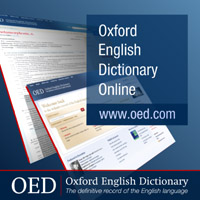Posted 3:54 p.m. Tuesday, Feb. 14, 2017

Take a look at the ultimate authority for the English language - the online Oxford English Dictionary. Free for UWL students, faculty, and staff to use.
 It’s iconic, it’s huge, and it’s known throughout the world as the ultimate authority for the English language. It’s the Oxford English Dictionary (OED), and in print (take a look in Murphy Library Reference for the call number PE1625 .O87), it takes a whole row of library shelves to hold the 20 huge volumes.
The online version - which has everything in the print version, and more - is available to UWL students through a Murphy Library subscription. If you’re on campus, you can go to the library website and find it in the A-Z list of databases, or you can just go to the public OED website and you’ll get in. From off campus, you’ll need to go through the library website and provide your NetID to log in.
Our top 3 reasons for using the Oxford English Dictionary (OED) are:
It’s iconic, it’s huge, and it’s known throughout the world as the ultimate authority for the English language. It’s the Oxford English Dictionary (OED), and in print (take a look in Murphy Library Reference for the call number PE1625 .O87), it takes a whole row of library shelves to hold the 20 huge volumes.
The online version - which has everything in the print version, and more - is available to UWL students through a Murphy Library subscription. If you’re on campus, you can go to the library website and find it in the A-Z list of databases, or you can just go to the public OED website and you’ll get in. From off campus, you’ll need to go through the library website and provide your NetID to log in.
Our top 3 reasons for using the Oxford English Dictionary (OED) are:
- To get a complete, credible definitions that you can trust 100% and that can make almost any paper look better if used as a citation.
- To see when and where a word was used for the very first time. For example, according to the OED, the word “disaster” was used by Shakespeare in 1604 to refer to an “obnoxious planet.” The word “scam” was first used in 1963 in Time Magazine.
- To learn how the meaning of a word changed over time. For example, the word “nice” started out meaning “foolish” or “silly” and somewhere in the 16th or 17th century underwent an unexplainable change to meaning something good or pleasing. The word “dope” when used as slang to mean excellent or good was first used in the song “Money” by Jimmy Spicer in 1981…”Yo, man, them boys is dope... This record is dope.”


